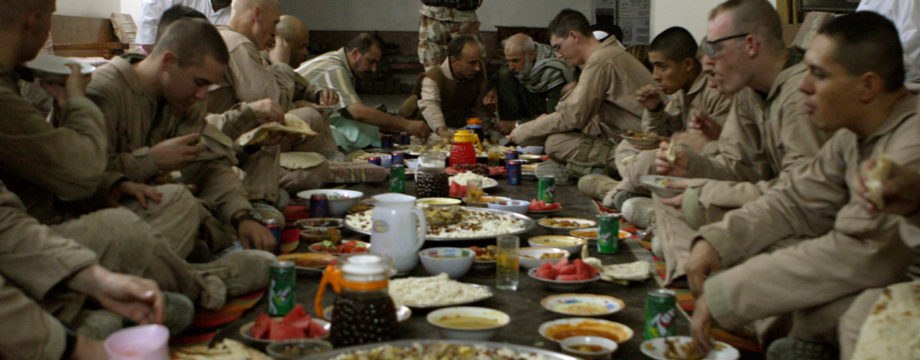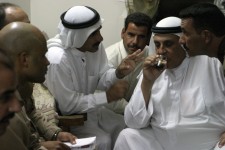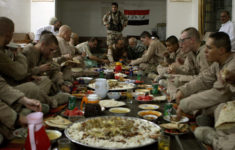Lima Company held a shurah and dinner with Sheikh Mishen, leader of the Jumaila tribe in Al-Karmah.
Contents
News
Karmah sheik confides in Marines
By Pfc. Brian Jones | | September 28, 2007
KARMAH, Iraq — “Be optimistic and you will find the good things.”
This is the notion of a prominent sheik in the city of Karmah, Iraq, who is working with Marines from 3rd Battalion, 3rd Marine Regiment, Regimental Combat Team 6, to create a peaceful today and a thriving tomorrow for a city that’s weighted down by conflict.
During July, 2nd Bn., 7th Marines, RCT-6, completed their tour and relinquished control over the battle space in and around the city where they had fought to dispose of the enemy seeded in the area.
“We’re falling in on the tail end of that so that we can bring the population to the next level and help get the economy moving again,” said Memphis, Tenn., native Capt. Quintin D. Jones, the commanding officer of Company L. “We are transitioning away from the kinetic fight and trying to help the local governance.”
While his Marines continue counterinsurgency operations, Jones is trying to kick start the city’s economy again hoping to tie it all back into larger levels of government.
“On one end I’m fighting, and on the other end I’m disputing between tribal leaders,” Jones said. “The other part (is) trying to stimulate the economy. So, it’s a three-block war here and it’s very, very dynamic.”
Local government has been restored, the city council assembled, and Karmah has an experienced official as mayor. With these three building blocks in place, Jones hopes the Karmah municipal government can tie back into its largest neighbor, Fallujah. Fallujah will then in turn tie Karmah into Ramadi, the provincial capital, so that once Coalition Forces have left, the local government can remain stable.
“The economy will still be thriving because it is tied into the old system that was here,” Jones said.
“I think that we are essentially running a small corporation,” Jones said, “because we are doing a lot of things at the same time.”
Jones prompted meetings with many of the sheiks of the surrounding tribes, Sept. 22, visiting their homes, congregating with them, and sharing their food and hospitality. This brought many of the sheiks to the table with other city officials to discuss what they had to offer the city.
“There is a serious cooperation that has taken place among the tribes and the Marines,” said Sheik Mishen of the Jumaila tribe, a dominant tribe in Karmah, through an interpreter. “What Capt. Jones did today was as example of our own way of dealing with things.”
Iraq’s political landscape, especially in the areas outside major cities such as Fallujah and Ramadi, is dominated by tribes, their sheiks and internal loyalties. Bringing sheiks into the civil reconstruction picture is what spurred the “Anbar Awakening,” said Gen. David H. Petraeus, commander, Multi National Force-Iraq. In that way, company commanders like Jones are doing their part to undertake the comprehensive plan put in place by Petraeus.
The relationship between the unit commander on the ground, whether he is Iraqi or a Coalition member, and the tribal authorities in his area is an essential part of making things work. It is something that has begun to pay dividends for Jones and his Marines.
Mishen agreed to Jones’ wishes and was willing to overcome animosity toward the sheiks of lesser stature to help improve the security situation in the city.
“I will set differences aside to do the right thing,” Mishen said. “No matter what happens, if anything advances the security of Karmah, I will cooperate.”
Mishen said he strongly opposes the violence that has been brought upon his tribe. Insurgent violence has touched him personally many times throughout the war, losing many of his cousins in attacks. Just weeks before, his daughter was killed in a mortar attack in the home in which Jones met him.
“So far security is very good,” Mishen said. “As far as Karmah is concerned, the Marines are doing an excellent job. With the cooperation between our people here, things are actually working for the best.”
Mishen said he values the Marines as the glue holding things together and is hoping the Marines will stick around until all the bad guys are captured.
He also shared great concern for what he considers a failing judicial system.
“If things continue like this, things will probably backfire on the system,” Mishen said. “I am optimistic, but there are some parts of Karmah that need to be cleaned up.
“We are going to rebuild the place, rebuild the hope and solve the problems of the poverty,” Mishen said about plans for the city. “Once the area is 100 percent secure, or secure enough, a lot of kids want to return to school. Education is the key.”
Mishen said he feels they need Jones to keep things going as well as they are. He equated the company commander’s importance to local reconstruction to the importance of President George W. Bush and high-level military leaders in national reconstruction.
“I know that Jones will be leaving, but I hope that in the short time that he is here things will change a lot more than in the past because of his presence,” Mishen said.
Source: Second Marine Division Press Release
Photography
- Captain Quintin Jones (L). Al-Karmah, Iraq. September 2007.
- Lima Company Marines. Al-Karmah, Iraq. September 2007.



